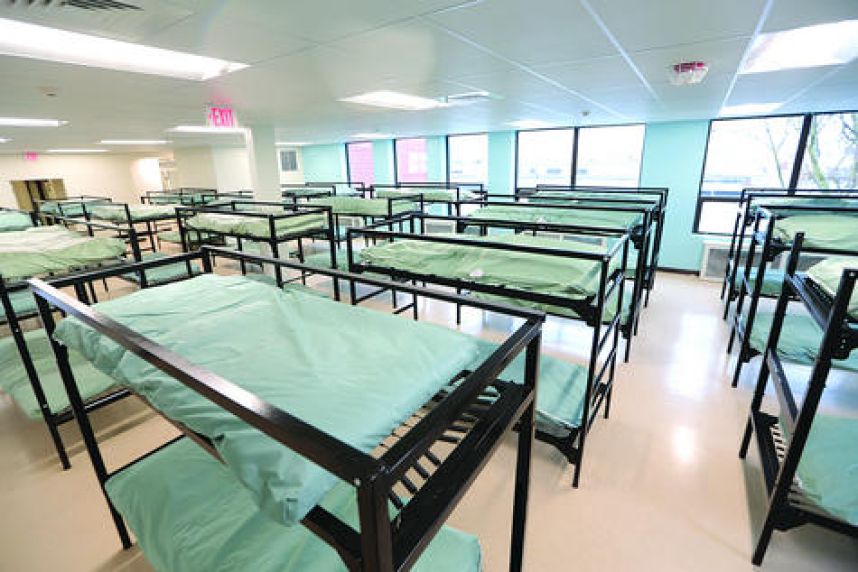This post was originally published March 29, 2017.
Closing two transitional housing programs that help homeless people with substance abuse problems sentences them to a state of “flux,” City Councilor Tito Jackson said Wednesday in calling for a hearing on the matter. The city announced last week that Project SOAR and Safe Harbor, two transitional housing programs located at the 112 Southampton Street city homeless shelter, would shut down because of funding cuts at the U.S. Department of Housing and Urban Development (HUD). Project SOAR, which stands for Stability, Opportunity, Achievement, and Recovery, provides 20 beds for homeless adults in transition while they work on their sobriety. Safe Harbor also has 20 beds and serves former addicts who are HIV-positive. These programs primarily serve men; 77 percent of opioid-related deaths last year were men, according to the Boston Globe. RELATED:Southampton Street beds to shelter hundreds of Boston’s homeless Both programs were previously housed at the Long Island Shelter, whichclosed abruptly in October 2014 when the bridge to the shelter was deemed unsafe. They were relocated to the Southampton shelter, which the city created in January 2015. “Although Project SOAR and Safe Harbor have been impacted by this shift in federal funding, it is important to note that no shelter beds have been lost,” Marjorie Nesin, a spokesperson for the Boston Public Health Commission, which runs the programs, said in a statement. “There are currently the same number of beds at the Southampton Street shelter as there were before.” Jackson disagrees.
“I just want to be clear that this is a loss of 40 beds,” Jackson said at Wednesday’s city council meeting. “Yes, the city is saying that they’re repurposing these beds for emergency shelters, but the Southampton shelter had the only dedicated recovery services in Boston that accommodated HIV-positive patients.” But Nesin said that the shelter will still continue to provide all of the HIV services.
” The transitional beds are becoming emergency shelter beds, and we will continue to provide wrap around services for HIV positive men,” she said. “The new model will simply help us get them from emergency shelter directly to permanent housing.” p.p1 {margin: 0.0px 0.0px 0.0px 0.0px; font: 15.0px Times; -webkit-text-stroke: #000000}span.s1 {font-kerning: none}
There are more than 300 homeless residents in Boston who are HIV-positive, Jackson said. Nesin said that the change will actually help BPHC provide services to more HIV-positive men.
RELATED:Give me shelter: City vying to re-bridge trust between former Long Island Shelter guests With the programs ending and the beds turning into emergency shelter beds, they will serve homeless residents who come in on a day-by-day basis. Jackson criticized the sudden change.
“The administration knew for two years that funds would be cut. It should not have happened abruptly. There’s no surprise here, and what does it to do the individual being supported?” he said. “It puts the most vulnerable individuals in our city into flux.” Sheila Dillon, Boston’s chief of housing and director of neighborhood development, confirmed to WBUR that the city has known for at least two years that HUD funding — which provided about $800,000 per year for both programs — would end. RELATED:Boston’s effort to end homelessness focuses on most vulnerable cases “As part of this national shift towards housing first, the US Department of Housing and Urban Development has curtailed its funding of transitional shelter beds,” Nessin said. ” HUD is now funding programs that enable homeless individuals to find permanent housing, along with the services they need to remain stable in housing.” Councilor AnnisaEssaibi George, who chairs the committee on homelessness, mental health and recovery, commended Jackson during the meeting for urging the city to “do more and do better.” But she also emphasized the commission’s point that in order to properly address homelessness, the city is shifting from focusing on temporary housing to getting homeless families and individuals into permanent housing. “We all agree that homelessness is a crisis for individuals and families,” Essaibi George said. “We also agree [that] the permanent solution to homelessness is housing. Shelters are not a solution, they’re just a stop gap.” This post has been updated to include addition comments from the Boston Public Health Commission.
Councilor bashes decision to shut 2 homeless recovery programs

NICOLAUS CZARNECKI/METRO


















